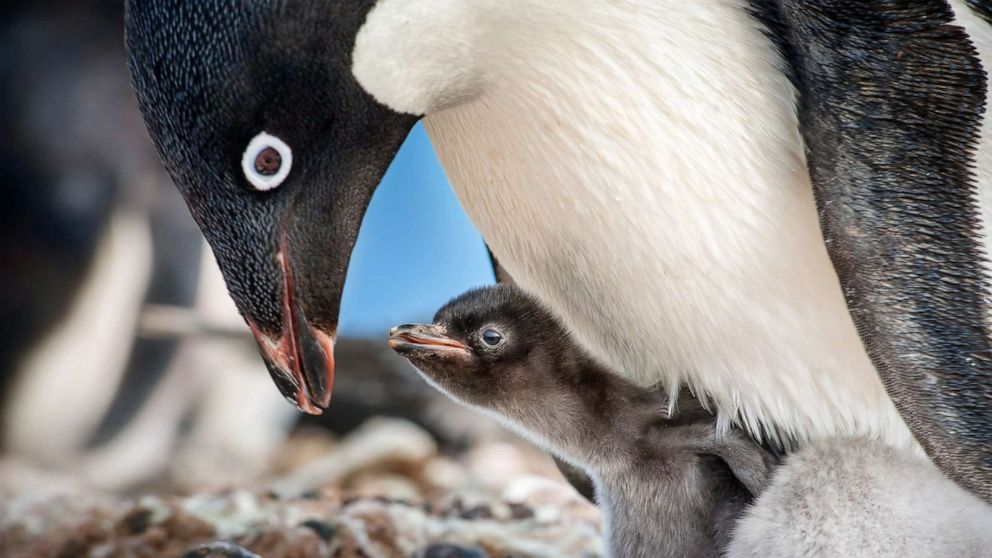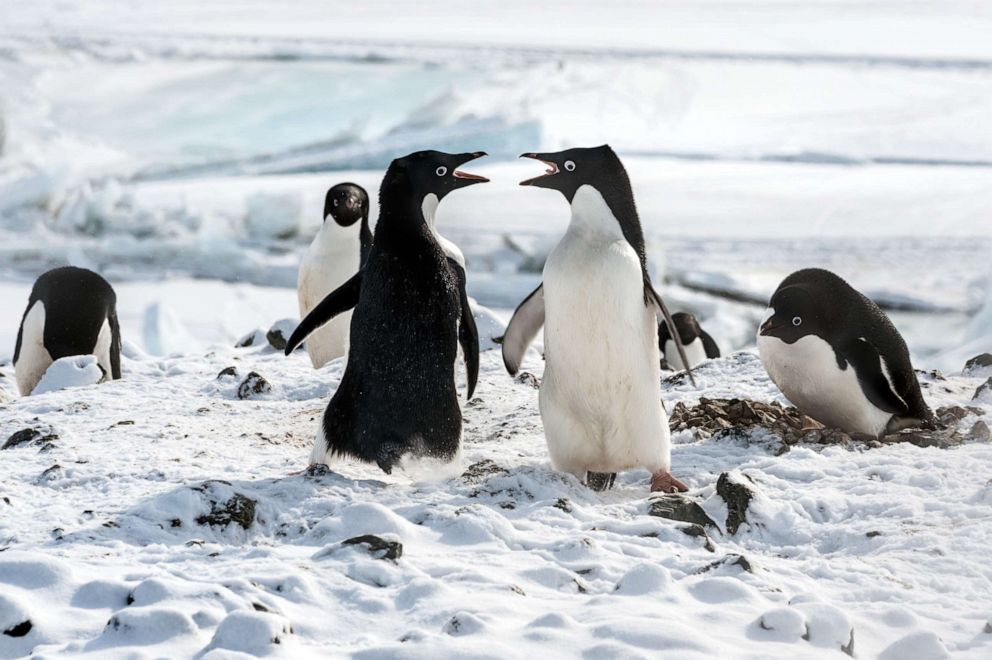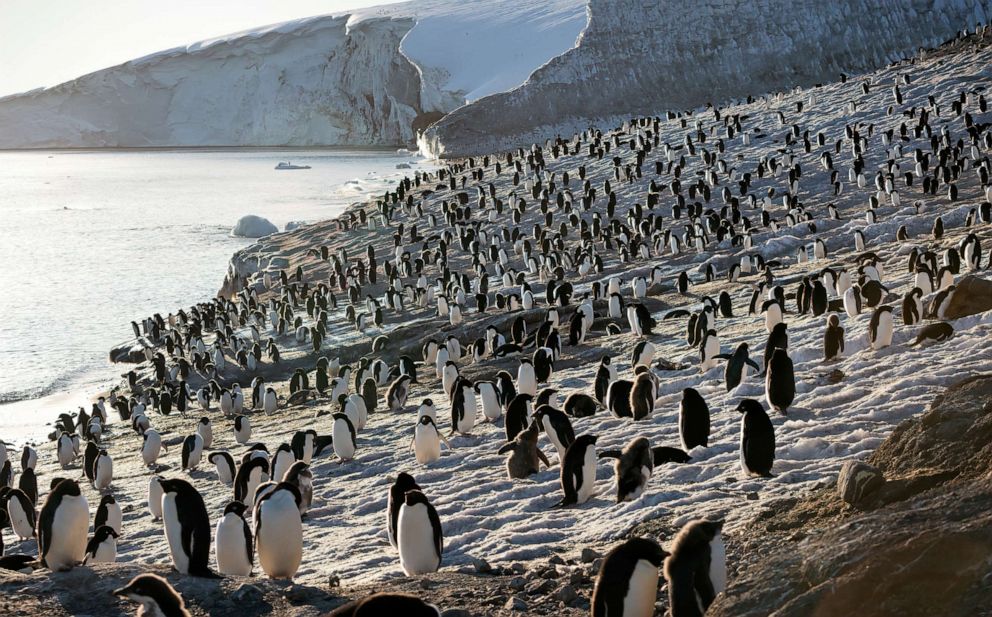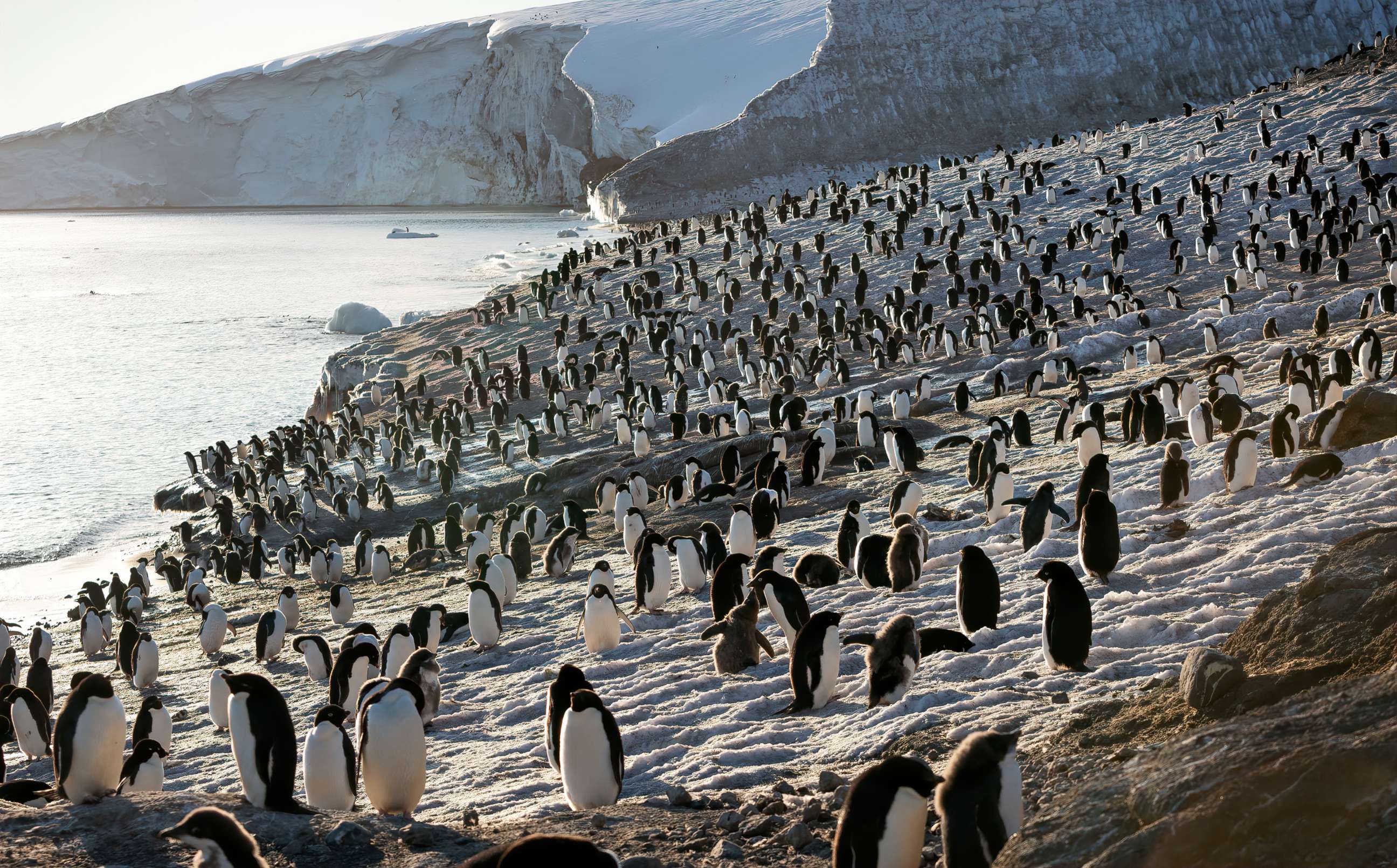Disneynature's 'Penguins' filmmakers on getting frostbite, creating a rock-n-roll penguin lead and promoting conservation
“When you...see the movie, you are helping Steve and all the penguin species."

Disneynature’s new feature film “Penguins” follows the story of a plucky Adelie penguin named Steve.
Ed Helms, who is best known for his roles on "The Office" and "The Hangover," brings the documentary movie to life as the narrator and the characterized voice for the principal penguin.
"From the very beginning, we really felt that Ed was a penguin," famed British documentarian Alastair Fothergill told ABC News’ Juju Chang in an interview for “Nightline."
“In a former life, he must have been a penguin,” he added.
Helms said the story of Steve is that of the underdog who fights against the odds in one of the harshest places on the planet.

Fothergill worked with his "Frozen Planet" counterpart Jeff Wilson to direct "Penguins" and said they’d both “worked in Antarctica a lot,” but always wanted to make a comedic film about nature.
“We recognized that the Adelie penguin was an amazingly characterful bird. And we've always wanted to do a Disneynature comedy,” Fothergill said. “We worked on a number of Disneynature movies and they've all had elements of comedy in them, but we reckon that the Adelie penguin was such a funny penguin that he could carry a whole comedy movie.”
Wilson added, “I think what we were trying to get in Steve -- is an imperfect penguin. We were really interested in telling a story about a first-time father, but a first-time father who is making mistakes like all of us fathers do."
Out of all the flightless, cold weather bird species, Wilson said they were drawn to Adelie penguins - and Steve in particular.
“I was sitting there watching these penguins build their nests, as they do," he recalled. "They take stones from different places and build them up to make these fantastic stone nests which keep their eggs off the ground. And there was this one penguin who was marching up the hill and grabbing stones and then muttering to himself as he came back down."
“Occasionally, he would fall over, and occasionally he'd drop his stone, and I just was watching him for a couple of hours thinking, ‘This guy's a doofus,’” Wilson said, laughing. "This is exactly the guy that we need to kinda profile. And that was the seed of Steve's character.”
Wilson said a good nest site “is everything in the penguin world.”
“[Steve] definitely tried and tried and tried again and didn't get it right for quite a long time,” Wilson said.
Steve’s efforts managed to attract Adeline, a female penguin, and their courtship began within the initial moments.
“She turns up and she's absolutely gorgeous,” Fothergill said. “The funny thing about penguins, when they first meet each other, they just literally look at each other. And then they do this absolutely beautiful head display. It's such an intimate display. And all the time, they're calling. And of course, that's vital.”
The directors utilized a soundtrack that includes songs from bands like REO Speedwagon and White Snake to personify their penguin star.
“We wanted to embody what Steve would listen to if he was a human being,” Wilson said. “Steve's mojo.”

“It just felt to me like if you were a not very good dad and you were out there driving around, you'd be listening to this kind of thing on the radio, and that just sort of, it felt like the right genre for Steve," he added.
As the story of Steve and Adeline plays out, the pair start a family and become parents to two baby birds.
The film captured intimate moments, like when Adeline leaves the nest to get fish and Steve has to step awkwardly into the father role for the first time.
They shot the epic scale scenes in hazardous filming environments on the highest resolution cameras. Shooting took three years to complete.
“Working in Antarctica is one of the hardest places to work on the planet,” Wilson explained. “And then, of course, we've got to be in the right place at the right time to capture penguin footage. And that's all about battling against the elements.”
Fothergill said that after about six weeks, the crew was “too tired.”
“But we filmed for three seasons, from the beginning of the season in October to the end of the summer in February. So every six weeks, we were turning -- changing people over,” he explained.
Wilson said he was “silly enough” to let his feet get too cold while filming. “In the process of trying to get back to the base, I managed to burst some of the cells in the base of my toe and that turned into frostbite," he said.
“It’s a very, very, very painful thing to go through -- I won't lie,” he said. “It's one of those circumstances that you would avoid if you had the chance again.”
Disneynature has reached a major milestone with “Penguins.” It’s the 10-year anniversary of the film company’s incredible wildlife journeys.
“Every year, every film has had a conservation initiative, where a percentage of the box office in the first week goes to things,” Fothergill said. “We've saved thousands of trees in the Brazilian rainforest. You know, hundreds of thousands of acres in Africa have been preserved.”
“And in this case, we're supporting the Global Penguin Society in amazing conservation work they're doing in the southern hemisphere, looking after the 18 different species of penguins on our planet, including Steve,” he said.

President of the Global Penguin Society and marine biologist Pablo Borboroglu said that one of the key things about this movie and Steve was to reach people’s "souls."
“We always like to say that our main goal is to change the behavior of people,” he said of the goal to work in conversation. “We cannot change the behavior of animals, of wildlife. So one of the key things is not to overload people with pure science. Because you don't reach them. And you need to reach their souls. You need to reach the emotions. And this movie is very accurate, in terms of science.”
He continued, “The story's told in a way in which they go to the emotion, through the story of Steve. And people can perceive that it's not that easy to be a penguin. It's not funny all the way. And they are facing a lot of threats.”
Adelie penguins are some of the most at-risk of their species, with the biggest threat being climate change and the warming of ocean temperatures, according to NASA’S Biodiversity Program. By the end of this century, the same data showed that 60 percent of the Adelie penguin population could be gone.
Borboroglu said this film will help make a great impact to his organization and their efforts.
“I think this is perfect, and it's excellent the way Disneynature is framing this,” he said. “For every ticket sold in the opening week, from the 17th until the 23rd, part of those tickets are going to be donated for these campaigns. But the key thing is -- is not only that people will go to see the movie, they will become part of the solution. Because Disneynature is giving them the opportunity to have a key role in penguin conservation.”
He went on, “When you go to see the movie, you are helping Steve, and all the penguin species in the planet. So you are becoming a penguin hero.”
Disney is the parent company of ABC News.



